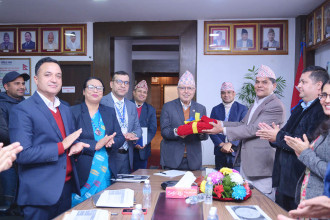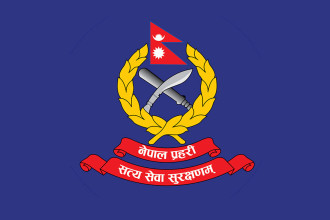-1717917028.jpg)
KATHMANDU: National Business Initiative (NBI), in partnership with USAID’s Tayar Nepal, recently organised a symposium on 'Promoting and Building Business Resiliency in Nepal' at the Hyatt Regency in Kathmandu.
The event aimed to recognise the significant role of the private sector in Disaster Risk Reduction (DRR) and its contribution to building resilient communities. The event featured two panel discussions and the presentation of the 'Business Resilience Award' to acknowledge and celebrate the contributions of private sector companies in disaster management and business continuity management.
NBI aims to inspire other businesses to prioritise preparedness and risk reduction initiatives within their operations, through recognition and award events and highlighting Business Continuity Management best practices for building business resilience and learnings of the private sector in contributions to disaster risk reduction and management (DRRM).
-1717917028.jpg)
-1717917028.jpg)
During the opening session, NBI President, Kush Kumar Joshi, highlighted the importance of the private sector's involvement in disaster management and resilience building. He remarked that the event can serve as a platform to share the successful efforts, challenges and learning of the private sector, within Nepal and other regions.
Inaugurating the event, chief guest, Krishna Bahadur Raut, secretary of the Ministry of Industry, Commerce and Supplies, said more than 90% of the government’s expenditure on disaster management is on post-disaster rescue, relief and recovery. UNDRR has identified more than 300 hazards but our government has recorded around 42 only. Now is the time to focus more on building resilience of infrastructures, private sector and ensuring uninterrupted service delivery during emergencies. He commended the efforts made by the private sector in disaster management and encouraged businesses to utilise CSR funds in their own resilience building and continuity management.
The symposium consisted of panel discussions focusing on the importance of disaster risk reduction and management in building resilient economies and the growing roles of the private sector in disaster management and business continuity management.
Speaking at the session, expert Man Bahadur Thapa said people don’t die because of the hazards but because of the weak structures and systems we’ve built that cause casualties during emergencies. Kush Kumar Joshi, who was also one of the panellists, stressed that business continuity planning needs to be institutionalised into business operations rather than seeing it as an additional financial burden. Firzan Hashim, country director of A-PAD, Sri Lanka, highlighted the importance and impact of private sector engagement in disaster management and how they need to have a link with multisectoral stakeholders like humanitarian organisations, government (including military and security forces), academia and media, in both regional and international level.
Various national and international experts shared their valuable insights and experiences during the event, highlighting the importance of awareness build-up and knowledge sharing about DRRM in order to make proactive preparedness and resilience building a habit for businesses, government and communities.
-1717917028.jpg)
Following the discussions, the 'Business Resilience Award' was presented to eight companies across various categories for their outstanding contributions to disaster risk reduction and business continuity management. Among the recipients were Ncell Axiata Ltd and Bottlers Nepal (Terai) Ltd for the multinational corporation category, Panchakanya Steel and The Nepal Distilleries for the large enterprise category, Nepal Dairy and Kanchanjangha Tea Estate and Research Center for the medium enterprise category, as well as Mahaguthi and Nepal Knotcraft Centre for the micro, cottage and small enterprise category. An independent jury committee selected the winners out of the nominations received from businesses across the nation.
The programme was attended by approximately 300 participants from private sector representatives, government officials, diplomatic missions, donor organisations, non-governmental organisations, NBI members and officials, including the media.
Given Nepal’s vulnerability to disasters, it is imperative to integrate disaster resilience into business strategies for sustainable development. The event concluded with a commitment to hold similar programmes annually, aiming to promote disaster management and resilience building in the private sector.
NBI, a leading private sector organisation promoting responsible business practices since 2005, continues to work towards disaster risk reduction and management in collaboration with the private sector and international agencies.






